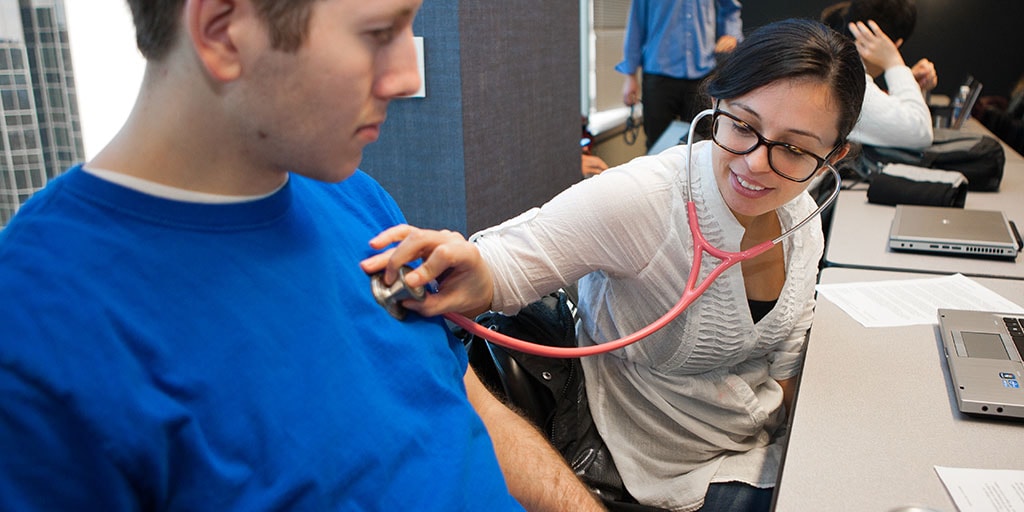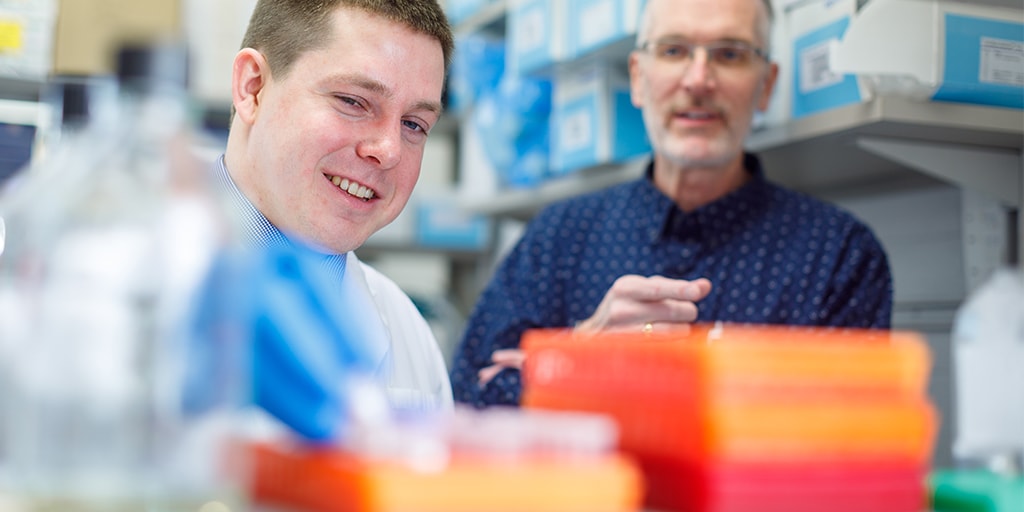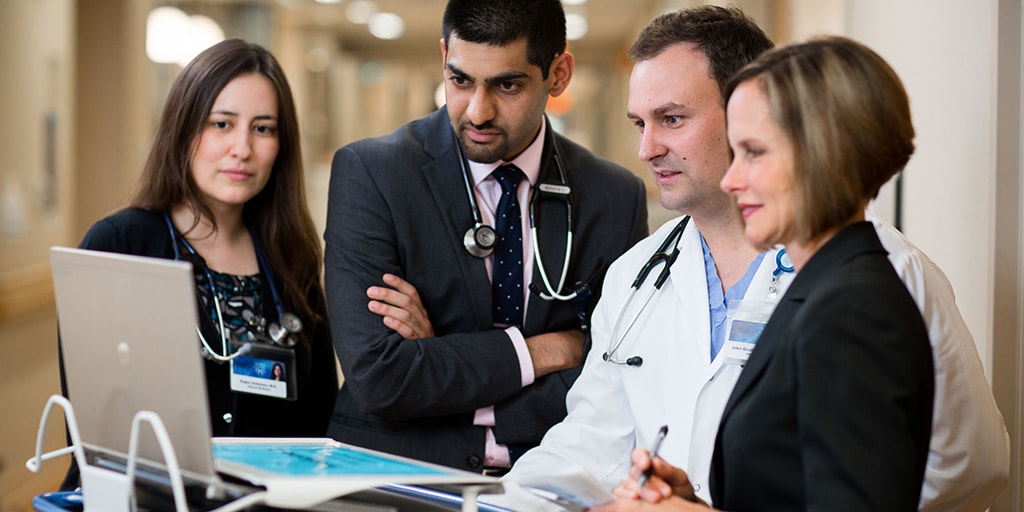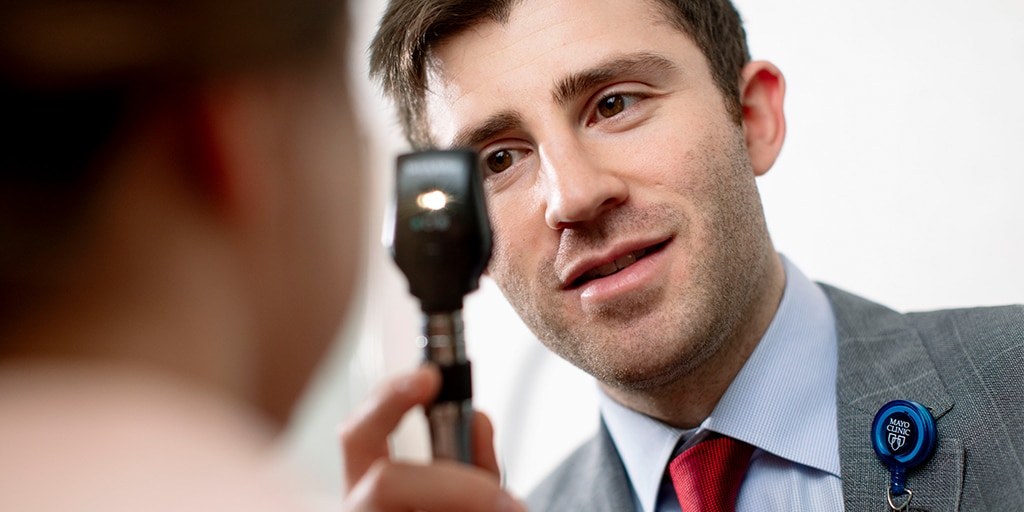Curriculum Timeline
/prod01/channel_2/media/mccms/content-assets/academics/biomedical-research-training/medical-scientist-training-program-mstp/MD-PhD_CurriculumTimeline_1024X512.jpg)
Training begins with a month-long laboratory rotation the summer before the start of medical school. Through lab rotations you will experience different types of research, laboratories, and mentors. You will use this rotation to help choose your area of specialization.
During lab rotation, students look forward to the M.D.-Ph.D. Program annual retreat for students and faculty. The retreat includes oral and poster presentations, program discussion, social time, and a lecture given by a Mayo Clinic physician-scientist or alum of the program.
- Preclinical/pre-thesis training
- Graduate training
- Re-entry phase
- Clinical training
Preclinical/pre-thesis training

Starting in July of the first year, clinical training begins within Mayo Clinic Alix School of Medicine.
You will complete the Pre-Clerkship curriculum in the Mayo Clinic Alix School of Medicine before your thesis research. This allows you to gain a strong biomedical foundation for both the investigative and clinical aspects of your career.
The Pre-Clerkship phase spans 18 months and establishes a knowledge base in the basic sciences and the pathophysiology of human disease through academic courses called “blocks.” This phase includes foundational science courses, systems courses, clinical integration, and the Transition to Clerkship course.
The Mayo Clinic Alix School of Medicine website has more details on the Pre-Clerkship curriculum.
The goal of this curriculum is to decrease the amount of time in lecture and enhance active learning. While we still hold required classroom lectures, the curriculum focuses more extensively on laboratory, small-group, and problem-based strategies.
Future physicians often learn best when they see a patient representing the topic. Our curriculum includes several half-days per week to focus on seeing patients in the specialty area associated with the organ block under discussion. By the end of your clinical training, you will have developed an extensive foundation in human biology as well as substantial clinical skills.
Separating the clinical training blocks are week-long Selectives. Selectives are dedicated one- to four-week curriculum blocks during which students have the opportunity for career exploration, self-directed learning, additional “shadowing” experiences, introductions to various labs, service learning, or volunteer work. There are also Selectives designed specifically for M.D.-Ph.D. students.
Other key milestones during the pre-clerkship/pre-thesis phase of your training are laboratory rotations and completing the process of selecting your Ph.D. thesis advisor.
Learn more about the M.D. Program within Mayo Clinic Alix School of Medicine.
Graduate training

After completing the United States Medical Licensure Examination (USMLE) Step 1 exam, you have the option to complete the required clinical clerkships (see below) or transition directly to your graduate studies, in which you will complete laboratory rotations and switch to your Ph.D. thesis research.
If you have not done so already, you will start by selecting your area of specialization (track) and Ph.D. thesis advisor (and thesis advisory committee members) from among the Mayo Clinic Graduate School of Biomedical Sciences faculty. The faculty participate in one of eight multi-disciplinary Ph.D. tracks, including:
- Biochemistry and Molecular Biology (BMB)
- Biomedical Engineering and Physiology (BMEP)
- Clinical and Translational Science (CTS)
- Immunology (IMM)
- Molecular Pharmacology and Experimental Therapeutics (MPET)
- Neuroscience (NSC)
- Regenerative Sciences (REGS)
- Virology and Gene Therapy (VGT)
Most students complete their graduate school courses by the end of their first year of graduate studies or early in the second year.
During the remainder of your graduate school time, your Ph.D. thesis research is your primary focus. You work closely with your mentor but also have collaborative interactions with other research faculty and their laboratories.
Learn more about the Ph.D. Program and specialization tracks within Mayo Clinic Graduate School of Biomedical Sciences.
Re-entry phase

The transition between graduate school training and clinical training can be challenging. To ease the transition, we include re-entry program phases in the curriculum.
To aid in the transition to the highly structured Mayo Clinic Alix School of Medicine curriculum from the more self-directed Ph.D. program curriculum, we offer medical school re-entry counseling. This includes informal meetings as well as other re-entry courses and opportunities. These re-entry phases provide helpful resources to guide you as you navigate between medical training and graduate training.
Clinical training

You re-enter medical school in the summer or fall after three or four years spent fulfilling Ph.D. requirements and successfully defending your Ph.D. dissertation (based on re-entry path selected). During this clinical training phase, approximately 18 months of advanced and elective clinical clerkships are required.
The Clerkship phase involves a combination of clinic- and hospital-based learning, including Internal Medicine, Surgery, Neurology, Psychiatry, Obstetrics and Gynecology, Pediatrics, Emergency Medicine, and Family Medicine.
During the Post-Clerkship phase, you can take additional elective rotations, particularly to explore your chosen subspecialties. Further clinical clerkships, and a set number of electives that are typically required of M.D. students, are not required for M.D.-Ph.D. students.
Ongoing activities
Several ongoing activities bring M.D.-Ph.D. students in all years of training together several times per month to increase their cohesiveness and camaraderie. These include, but are not limited to:
- Weekly M.D.-Ph.D. Conferences that address a variety of topics
- Annual M.D.-Ph.D. Retreat
- M.D.-Ph.D. Day (Bench-to-Bedside Lecture)
- Meetings with the Director
- Annual M.D.-Ph.D. Program Progress Evaluation
- National M.D.-Ph.D. Student Conference and American Physician Scientist Association (APSA) National Conference
- American Physician Scientist Association (APSA) Events - Local Chapter